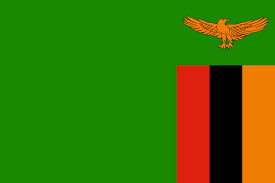Southern African Development Community
Zambia

Zambia
Zambia is an entirely landlocked country covering an area of 752,612 km². To the north, it is bordered by the Democratic Republic of Congo and the United Republic of Tanzania, to the west by Angola, to the southwest by Namibia, to the east by Malawi and Mozambique, and to the south by Zimbabwe and Botswana. Zambia sits on a gently undulating plateau, which is between 900 and 1,500 metres above sea level. This plateau is a mix of woodland and savannah regions interspersed with lakes, rivers, hills, swamps and lush plains.
Zambia has three distinct seasons, the hot, dry season runs from September to October when temperatures range from 27 to 32 °C. The warm wet season is from November to April and the cool dry season runs from May to August when temperatures range from 16 to 27 °C. The average annual rainfall is between 508 and1, 270mm.
Zambia’s population is approximately 13,459,000 (latest census) and most of the people are African, with small Asian and European minorities. English is the official language and is widely spoken throughout the country. There are seven main vernacular languages: Nyanja, Bemba, Tonga, Lozi, Luvale, Lunda and Kaonde, with more than 70 dialects spoken across the country. Lusaka is the capital city and is believed to be the fastest-growing city in Central Africa. Livingstone is another main centre, the former capital of Zambia, located eight kilometres from Victoria Falls. In 1972, Zambia has declared a one-party State but reverted back to multi-party democracy in December 1990 and with general elections held in October 1991. The President is the Head of State.
Mining and quarrying account for a large proportion of Zambia’s merchandise exports and have traditionally contributed the largest proportion of the country’s total Gross Domestic Product (GDP). Zambia is presently the world’s fourth-largest producer of copper and has around 6 % of the world’s known reserves. Zambia is richly endowed with various minerals such as copper, cobalt, gold and various precious stones including amethyst, blue stones, emeralds, etc. Other contributors to the economy are industry, fishing and agriculture. Zambia’s manufacturing sectors has continued to show signs of growth in recent years. Its contribution to GDP has averaged 26 %. Zambia’s manufactured export products include engineering products, textiles, building materials, processed foods, animal products, and leather products. Commercial fish production is approximately 70,000 tonnes per year.
The tourism sector has consistently demonstrated growth due to a rich natural heritage, including great waterfalls, rivers, lakes, and a wealth of wildlife roaming in its vast sanctuaries. The most stunning geographical feature is the Victoria Falls, on the southern border with Zimbabwe, and is one of the natural wonders of the world. Zambia has 19 national parks, and 34 game management areas, some of the highlights are Luangwa and Kafue National Parks, Lower Zambezi National Park, Victoria Falls, Mosi-Oa-Tunya National Park and Lochinvar National Park. In addition to the national parks, Zambia has beach resorts on Lake Tanganyika at Kasaba, Nkamba and Ndole bays, and Lake Kariba, a man-made lake.
Titles | Information |
Head of State | H.E. Hakainde Hichilema |
Head of Government ( f applicable) | - |
Capital City | Lusaka |
Independence Day | 24 October 1964 |
Languages | English, Bemba, Nyanja,Tonga, Lozi |
Currency | Zambian Kwacha (ZMK) ZK 1 = 100 ngwee |
Area/Size of the country (km²) | 752,612 |
Natural resources | Minerals, wildlife, timber and natural vegetation, water |
Government website link | |
Statistical indicators | Please refer to the latest SADC Statistics Yearbook |
Zambia SADC National Focal Point
Mrs Isabelle M Lemba SADC National Contact Point Permanent Secretary Charter House, Independence Avenue P O Box 50069 LUSAKA, ZAMBIA Cell: +260 978 702080 Tel: +260 211 252 023 Fax: +260 211 250080; +260 211 252666 Email: mfa@grz.gov.zmIsabelle.Lemba@mofa.gov.zm Lubasi.mungandi@mofa.gov.zm; chansa.ngilazi@mofa.gov.zm; Patricia.Kondolo@mofa.gov.zm |
Sign in to add your comment.